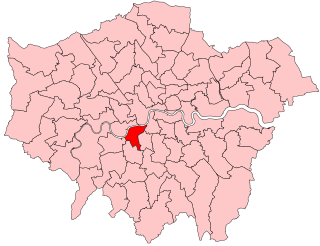
Battersea is a constituency in the London Borough of Wandsworth. It has been represented since 2017 by Marsha de Cordova of the Labour Party.

Dublin Central is a parliamentary constituency represented in Dáil Éireann, the lower house of the Irish parliament or Oireachtas. The constituency elects four deputies on the system of proportional representation by means of the single transferable vote (PR-STV).

Dublin South was a parliamentary constituency represented in Dáil Éireann, the lower house of the Irish parliament or Oireachtas, from 1981 to 2016 representing an area in the south of County Dublin. A previous constituency of the same name existed in Dublin City from 1921 to 1948. The method of election was proportional representation by means of the single transferable vote (PR-STV).

Dublin South-Central is a parliamentary constituency in Dublin City represented in Dáil Éireann, the lower house of the Irish parliament or Oireachtas. The constituency elects four deputies on the system of proportional representation by means of the single transferable vote (PR-STV).

Dublin South-West is a parliamentary constituency represented in Dáil Éireann, the lower house of the Irish parliament or Oireachtas. The constituency elects five deputies on the system of proportional representation by means of the single transferable vote (PR-STV).

The House of Assembly of Barbados is the lower house of the bicameral Parliament of Barbados. It has 30 Members of Parliament (MPs), who are directly elected in single member constituencies using the simple-majority system for a term of five years. The House of Assembly sits roughly 40–45 days a year and is presided over by a Speaker.

General elections were held in Barbados on 24 May 2018. The result was a landslide victory for the opposition Barbados Labour Party (BLP), which won all 30 seats in the House of Assembly, resulting in BLP leader Mia Mottley becoming the country's first female Prime Minister. The BLP's victory was the first time a party had won every seat in the House of Assembly. Previously, the most one-sided result for a Barbadian election had been in 1999, when the BLP won 26 of the 28 seats. The BLP's 73.5 percent vote share was also the highest on record.
A by-election was held in the Barbadian constituency of St Lucy on 29 November 1954.
By-elections were held in the Barbadian constituencies of St Joseph and St John on 21 May 1958.
A by-election was held in the Barbadian constituency of the city of Bridgetown on 29 May 1969 after the death of Barbados National Party member Louis Lynch who was the representative of the constituency in the House of Assembly of Barbados. It was the first election held after Barbados gained independence from the British Empire in 1966.
A by-election was held in the Barbadian constituency of the St Joseph on 3 December 1970 after the resignation of Barbados Labour Party member Grantley Adams who was the representative of the constituency in the House of Assembly of Barbados.
By-elections were held in the Barbadian constituencies of St. Philip North and the city of Bridgetown on 26 February 1976 and 12 May 1976 respectively. Both elections were triggered based on the resignations of House of Assembly representatives Elliot Mottley and Neville Maxwell. It was the first by-election held under the new single-member first-past-the-post system.
A by-election was held in the Barbadian constituency of the St. Michael South Central on 6 July 1978 after the resignation of Democratic Labour Party member Frederick Smith who was the representative of the constituency in the House of Assembly of Barbados.
A by-election was held in the Barbadian constituency of the St. Peter on 19 July 1984, and then again on 22 November 1984, after the resignation of Barbados Labour Party member Walter Hinds who was the representative of the constituency in the House of Assembly of Barbados.
A by-election was held in the Barbadian constituency of the St.Thomas on 23 May 1985 after the death of the second prime minister of Barbados Tom Adams. He was a Barbados Labour Party member and the representative of the constituency in the House of Assembly of Barbados.
A by-election was held in the Barbadian constituency of the St. Michael North West on 4 December 1996 after the resignation of Democratic Labour Party member Lawson Weekes who was the representative of the constituency in the House of Assembly of Barbados.
A by-election was held in the Barbadian constituency of the St. Thomas on 21 September 2001 after the resignation of Barbados Labour Party member David Simmons who was the representative of the constituency in the House of Assembly of Barbados. It was first election in the country that took place in the 21st century.
A by-election was held in the Barbadian constituency of the St. John on 20 January 2011 after the death of the sixth prime minister of Barbados David Thompson. He was a Democratic Labour Party member and the representative of the constituency in the House of Assembly of Barbados.
Saint Lucy is a constituency in the Saint Lucy parish of Barbados. It was established in 1645 as one of the original 11 constituencies. Since 2018, it has been represented in the House of Assembly of the Barbadian Parliament by Peter Phillips. Philips is a member of the BLP.
Saint John is a constituency in the Saint John parish of Barbados. It was established in 1645 as one of the original eleven constituencies. Originally the constituency, like the other original ten, was represented by 2 members until 1971 when the single-member system was introduced. Since 2018, it has been represented in the House of Assembly of the Barbadian Parliament by Charles McDonald Griffith. Griffith is a member of the BLP.








